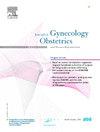孕妇对产前糖皮质激素的血糖反应:一项范围审查。
IF 1.6
4区 医学
Q3 OBSTETRICS & GYNECOLOGY
Journal of gynecology obstetrics and human reproduction
Pub Date : 2025-09-09
DOI:10.1016/j.jogoh.2025.103029
引用次数: 0
摘要
背景:产前糖皮质激素与糖尿病妇女显著的短暂性高血糖有关,然而,产前糖皮质激素对非糖尿病妇女及其新生儿的血糖作用尚不清楚。目的:探讨无糖尿病孕妇在胎儿肺成熟过程中产前使用糖皮质激素对孕妇血糖的影响,以及孕妇血糖与新生儿低血糖的关系。研究设计:于2025年5月使用Ovid Medline和Embase数据库进行系统检索,以确定报告产前接受糖皮质激素治疗的无糖尿病妇女血糖结局的相关研究。关注的关键结果是产妇血糖模式;次要结局包括新生儿低血糖的患病率以及可能预测产妇高血糖的因素。结果:14项研究符合纳入标准,包括12项队列研究和2项随机对照试验。所有的研究都一致报道了未患糖尿病的妇女在给予倍他米松或地塞米松后出现产妇高血糖的情况,患病率为54-95%。虽然有三项研究使用胰岛素来控制孕产妇高血糖,但剂量差异很大,治疗对孕产妇和新生儿结局的影响尚不清楚。结论:在未患糖尿病的妇女中,产前使用糖皮质激素后产妇高血糖非常普遍;然而,目前尚不清楚这是否与新生儿低血糖等不良后果有关。目前没有足够的数据支持监测或管理产前接受糖皮质激素治疗的非糖尿病患者的高血糖,然而,考虑到高血糖的程度和持续时间,需要大型多中心试验来为临床实践提供信息。本文章由计算机程序翻译,如有差异,请以英文原文为准。
Maternal glycaemic responses to antenatal glucocorticoids: a scoping review
Background
Antenatal glucocorticoids are associated with significant transient hyperglycaemia in women with diabetes, however, the glycaemic effects of antenatal glucocorticoids for women without diabetes and their neonates are unknown.
Objectives
To investigate the maternal glycaemic effects of antenatal glucocorticoids administered for fetal lung maturation in women without diabetes, as well as the association between maternal glycaemia and neonatal hypoglycaemia.
Study design
A systematic search was performed in May 2025 using the Ovid Medline and Embase data bases to identify relevant studies reporting glycaemic outcomes for women without diabetes receiving antenatal glucocorticoids. The key outcome of interest was maternal glycaemic patterns; secondary outcomes included the prevalence of neonatal hypoglycaemia as well as factors that may predict maternal hyperglycaemia.
Results
There were 14 studies that met the inclusion criteria, comprising 12 cohort studies and 2 randomised controlled trials. All studies unanimously reported maternal hyperglycaemia following the administration of either betamethasone or dexamethasone in women without diabetes, with a prevalence of 54-95 %. While three studies utilised insulin to manage maternal hyperglycaemia, dosages varied significantly, and the impact of treatment on maternal and neonatal outcomes remains unclear.
Conclusions
Maternal hyperglycaemia is highly prevalent following antenatal glucocorticoids in women without diabetes; however, it is currently unclear whether this is associated with adverse outcomes including neonatal hypoglycaemia. There is currently insufficient data to support monitoring or management of hyperglycaemia in patients without diabetes receiving antenatal glucocorticoids, however, given the extent and duration of hyperglycaemia documented, large multi-centre trials are required to inform clinical practice.
求助全文
通过发布文献求助,成功后即可免费获取论文全文。
去求助
来源期刊

Journal of gynecology obstetrics and human reproduction
Medicine-Obstetrics and Gynecology
CiteScore
3.70
自引率
5.30%
发文量
210
审稿时长
31 days
期刊介绍:
Formerly known as Journal de Gynécologie Obstétrique et Biologie de la Reproduction, Journal of Gynecology Obstetrics and Human Reproduction is the official Academic publication of the French College of Obstetricians and Gynecologists (Collège National des Gynécologues et Obstétriciens Français / CNGOF).
J Gynecol Obstet Hum Reprod publishes monthly, in English, research papers and techniques in the fields of Gynecology, Obstetrics, Neonatology and Human Reproduction: (guest) editorials, original articles, reviews, updates, technical notes, case reports, letters to the editor and guidelines.
Original works include clinical or laboratory investigations and clinical or equipment reports. Reviews include narrative reviews, systematic reviews and meta-analyses.
 求助内容:
求助内容: 应助结果提醒方式:
应助结果提醒方式:


